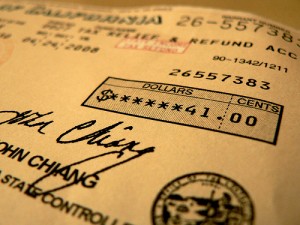 No matter how much you know about money or how well you manage yours, chances are there are things you do that you know are wrong, but can’t give up. For me, it’s overpaying taxes.
No matter how much you know about money or how well you manage yours, chances are there are things you do that you know are wrong, but can’t give up. For me, it’s overpaying taxes.
Here’s my confession: even though I’m married and file my taxes as a business due to various income sources, my tax withholdings are still set to the max.
I know it’s stupid. I know that my tax withholdings should be set so that I’m paying the right amount of taxes out of each check, owe nothing, and get no refund. I know that the smart thing to do is invest or save that extra money every week so I’m earning interest. I just can’t kick my tax refund habit, though.
The truth is, I don’t trust myself. Saving that money throughout the year takes a lot more discipline than letting the IRS hold on to it. Sure, my checks would be a little bigger every other week if my with holdings were set correctly, but an extra $200 a month can be frittered away so easily.
Earning interest requires putting every penny in the bank. That can be really difficult for someone like me who battles the evils of lifestyle inflation. I work hard to combat it, and for the most part I avoid major inflation, but when you’re living on a very tight income, it’s incredibly difficult not to add expenses as income increases. When that money comes in a lump sum, though, it’s a lot easier for me to commit it to savings or something purposeful.
We received our tax refund today, and it’s already been moved to savings to finish up our Europe fund and give us a pretty big head start on our moving fund.
I wish I had the self discipline to earn interest on that income all year, but in the end it would only add about $50 to my total. I know, $50 is better than nothing, but I can’t say I regret it. It’s unlikely I would save an additional $200 a month if my withholdings were set correctly. It would likely be spent on other things. Besides, nothing feels better than moving a big lump sum of money into savings and seeing my percentage increase overnight. Tax refunds are my personal finance guilty pleasure.
What about you? Do you like to get a refund every year, or do you set your withholdings correctly?
